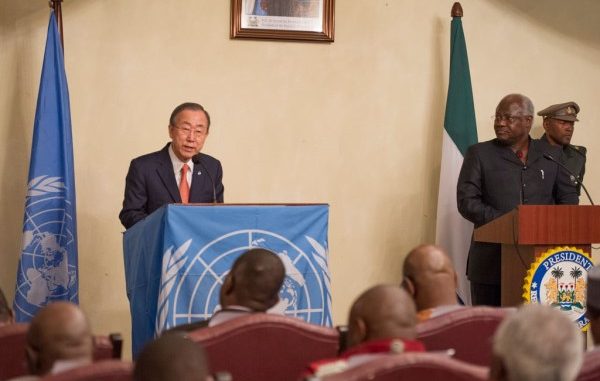
Freetown, 5 March 2014 – It is a great honour and pleasure for me to be back in Sierra Leone for the second time as Secretary-General of the United Nations . In fact, including my previous visit, this is my third visit. The first was in 2002 when I was working as Chief of Staff of the President of the General Assembly of The United Nations. I paid a visit to UNAMSIL at that time. In a UN capacity, this is my third visit. I am very pleased to be back.
I am honoured to join the Government and people of Sierra Leone in celebrating the completion of the UN Integrated Peacebuilding Office, UNIPSIL.
This marks the end of more than 15 years of successive peace operations that all played critical roles in supporting Sierra Leone’s remarkable transition from war to peace.
For me personally I feel very proud that I have been witnessing or observing all this process — except UNAMSIL, the first UN Mission […] I have been observing and witnessing and I am very proud to be witnessing this one.
Sierra Leone represents one of the world’s most successful cases of post-conflict recovery, peacekeeping and peacebuilding. Here we have seen great strides towards peace, stability and long-term development.
Sierra Leoneans can be proud of the Special Court a landmark in the global struggle against the worst crimes.
The transition from UNIPSIL a political mission – to a more development-focused UN presence testifies to the determination of the Sierra Leonean people to put the war behind them.
The international community has stayed the course through the challenging process of keeping, consolidating and building peace. Other countries that are now torn by war can draw hope and lessons from Sierra Leone’s inspiring example of the power of international solidarity and national resolve to overcome even the most brutal conflicts.
President Koroma and I just had very constructive discussions on a number of issues, including the continued cooperation between the United Nations and the Government of Sierra Leone.
Later today, I will meet with representatives of the political parties, as well as civil society.
I commend all Sierra Leoneans for completing three peaceful and democratic elections since the end of the civil war, accompanied along the way by the United Nations.
I am especially pleased that the Sierra Leone Police and Armed Forces are serving in United Nations and African Union peacekeeping operations in Darfur, Lebanon, Mali, Somalia, South Sudan and Sudan.
This is a powerful example of the country’s progress and the growing professionalism and institutional development of its security forces. It is also a strong vote of confidence in the value of UN blue helmets from a country that once hosted the largest UN peacekeeping operation in the world in its day.
Today we will formally close UNIPSIL – but the UN Country Team will continue to accompany the people and Government of Sierra Leone on the journey to long-term development.
The specialized agencies will carry forward some of UNIPSIL’s residual tasks, including support for the ongoing constitutional review process.
We are also finalizing the UN Development Assistance Framework – UNDAF – to support the Government’s Agenda for Prosperity.
As we mark the successful completion of UNIPSIL’s mandate, we recognize that efforts must continue to build a more peaceful, democratic and more prosperous country based on the principles of the rule of law and good governance.
I am confident that under the leadership of President Koroma, Sierra Leone will further advance towards a better future. The United Nations is ready, always, to work with the Government and people of Sierra Leone.
Question: I am wondering with the UN mission closing down at the end of this month whether the United Nations will continue to stay very much engaged in Sierra Leone?
Secretary-General: I can confirm here officially that the United Nations will continue to stand together with the Government and people of Sierra Leone in their march toward further and more participatory democracy and sustainable development and also promoting human rights. These [are] major principles and goals of the United Nations.
While this United Nations political mission will be closing down as of March 31st, all this mission’s functions will be integrated into the United Nations Country team based on the UN Development Assistance Framework called UNDAF. And our Resident Coordinator representing the United Nations country team will very closely coordinate with the Sierra Leone’s Government. As you know, we have 15 resident UN missions, funds and programmes and four non-resident ones — that includes 19 UN funds and programmes and agencies. All come from different agencies but they are coming with the same goals and objectives: to help the people of Sierra Leone and the Government onto a sustainable development path in the social, economic and environmental dimensions. So you have our firm support. My message at this time is that those countries who are still not overcoming the conflict stage with the United Nations’ engagement should learn the examples of Sierra Leone and how the Sierra Leonean people and government could have been able to achieve this in such a short period of time – 15 years. There are certain missions which have commemorated 50 years of UN engagement, peacekeeping operation. This is not what we want. We want all these countries to learn the lessons from Sierra Leone.
Q: The UN is moving from peacebuilding to development in the county so is the UN satisfied with the country’s leadership and our human rights record?
SG: Mr. President and I are fully in agreement that, while this is something to be commended and celebrated, the fact that you are moving from a UN political mission to a UN development process, this does not give any reason to be complacent with this current situation. There are still many challenges. You have made great progress in terms of establishing peace and security, in terms of providing free health medical services and good education, gender empowerment – but there are still many, many more important challenges. Still half of your population lives under the poverty line, still there are many women and children dying from preventable diseases. These [are] needless deaths, we have to prevent this. You have to educate people. You have to enhance the capacity of your people. You have to put more foundation of the rule of law and also [do] more to protect and promote human rights and particularly those of vulnerable people, women and girls and small minority groups. Therefore, it is very important that the President and the government and the people work together to promote further democratic process, including human rights. I have emphasized the importance of gender empowerment. Women should be given at least equal opportunity, if not more than men.
Q: What is the UN’s concern on climate change and how is Sierra Leone expected to participate in this process? Secondly, are you concerned that Russian troops will go beyond the Crimean region of Ukraine?
SG: For your first question on climate change, I had an in-depth discussion with President Koroma in my bilateral meeting and with the cabinet members, including the Vice-President. This is one of the most serious, important issues which world leaders must tackle without wasting any further time. Time is of essence. You have seen so many such cases of extreme weather patterns which have been striking all around the world. It is not only in the developing world; it happened even in the middle of New York, Manhattan. So it is happening. Climate change is happening much, much faster than one would expect. The science has made it simply clear that climate change is happening because of human behaviour. And if it is happening because of us then it is us, we, human beings, who must address this one, who must correct [it]. We have only one earth, one planet earth. Some people who are wasting, who do not support this, may think that we have “planet B”. No, we only have one planet earth. There is no plan B. We have only plan, one plan A. That is why I really am emphasizing the importance of this issue, particularly we need a political leadership role. That is why I am convening on 23 September this year at the United Nations a world leaders climate change summit meeting. This time I am inviting not only political leaders but business leaders and civil society leaders because this is one that everyone must be doing. There [are] no national, geographic boundaries. Climate change might have happened because of some part of industrialized countries but the impact does not respect any natural borders. It impacts the whole world, all of us. We must have a universal, global, legal climate agreement by 2015, next year. That is a must. That is why the United Nations has taken three priorities now: one priority, the Millennium Development Goals. The second priority: define post-2015 […] that is sustainable development goals. Then climate change. So I have invited President Koroma and he gladly accepted that he would come, and I asked President Koroma, African leaders, that they raise their voices. If not African leaders who have to raise voices, who will do it? We need to do it.
On your second question, in fact I am not here to address all these questions but while I stay here, I am also addressing this issue. This is very, very serious issue. Even this morning in Freetown, I had a long talk with Secretary of United States John Kerry on how to address this issue. During the last few days, I have been engaging with many world leaders, starting from President Putin of the Russian Federation and I met the Foreign Minister of Russia two days ago in Geneva. I have been engaging with the leaders of France, Great Britain, Germany, the European Union, the OSCE and many world leaders with whom I have discussed this matter very seriously. As Secretary-General of the United Nations, what is most important and urgent is that the principle of unity, sovereignty and territorial integrity of Ukraine must be protected. Preservation, protection of this is very important. This is a fundamental principle of the United Nations Charter. It is clear. At the same time, I have been urging both parties and other concerned parties to lower down their temperature, lower their unnecessarily provocative rhetoric. I have been urging Russian and Ukrainian authorities to sit down together and engage in constructive and direct dialogue to resolve this issue. I have dispatched my Deputy Secretary-General, Jan Eliasson, to Kiev. He is now in Kiev. I also dispatched my Special Envoy Robert Serry to Kiev. He visited Crimea yesterday and he is still in Crimea to apprise of the situation there and how the United Nations can help this one. Most importantly, this should be resolved between the parties concerned. But because peace and security in Ukraine has very serious regional and in a sense global implications, we must address this issue on an urgent basis. And I am urging from Freetown again those leaders of Russia and the Ukrainian authorities to sit down together and directly resolve this issue. And the UN is ready to provide whatever assistance and role to play in first of all defusing these tensions and also help maintain all United Nations Charter principles of unity, sovereignty and territorial integrity. Thank you.
Q: What message of hope do you have for the people of Sierra Leone that as we journey into the Agenda for Prosperity the UN will continue to stand by us until we attain sustainable national development?
SG: Thank you. Before I answer your question, let me add one [thing] which I had forgotten to mention about the situation in Ukraine. I have decided to dispatch the Assistant Secretary-General for Human Rights, Mr. Ivan Simonovic, to Ukraine to visit Kiev and the eastern part of Ukraine, including Crimea, to see and monitor the human rights situation there. This is what I wanted to add to the AP correspondent.
On the question raised by you – what kind of message we can learn from the people of Sierra Leone-, my first answer would be that the people of Sierra Leone should be very proud of what they have achieved. Out of this civil war, out of war, you have successfully established peace and stability not only for your own country but also for the region. From a recipient country of United Nations peacekeeping operations, you have transformed yourself as a donor country in peacekeeping operations. As I just mentioned, you are at least participating in six or seven peacekeeping operations. It is not only on the African continent, […] in Lebanon, UNIFIL. That means you are contributing to global peace and security. You should be proud of that. Now you are making remarkable economic progress — 13 to 14 per cent annual economic growth. That is remarkable. It is very difficult to see that kind of economic growth at this time particularly. I know that many African countries are making good economic progress, around 6 to 8 or 9, even 10 per cent. This 13-14 percent is remarkable. I hope this will continue under the leadership of President Koroma. The United Nations will spare no effort in working together with concerned, related ministries and ministers and business communities to work for that progress so that President Koroma and his successors will be able to meet this vision of President Koroma, Agenda for Prosperity, even five years before, as he mentioned — by 2030, in line with the United Nations sustainable development blueprint. Now, that I said should not be a source of complacency. There are many areas [in which] you have to grow. I have emphasized the importance of a firm foundation of rule of law, good governance, quality education. Those are two pillars on which you can build further. When you have good governance on the basis of a good rule of law system, you can build further your economic and social and political stability. When you have educated, trained human resources through quality education that is promising a future much, much better and brighter future of your country. This is what I can tell you based on the experience of my own country, Korea: good education, good governance and foundation of the rule of law. I hope this will give some further motivation to Sierra Leoneans to move ahead for a brighter, better future for all. Thank you very much.

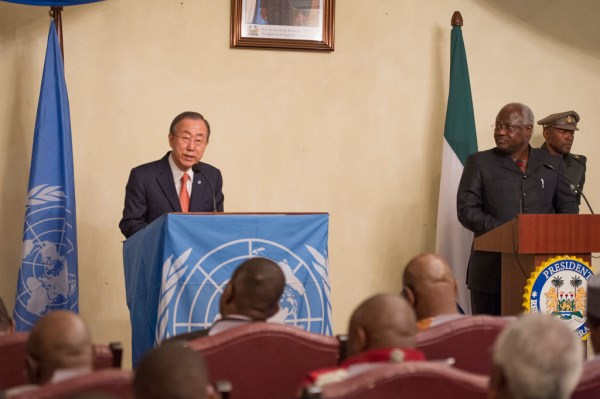
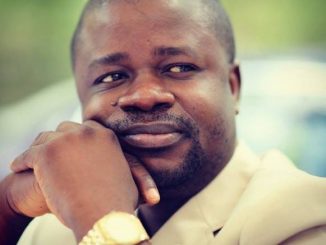
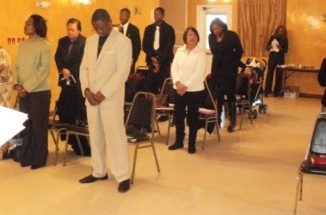
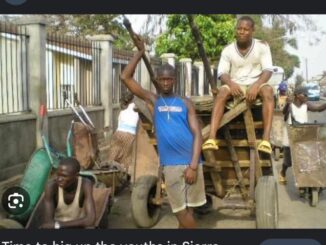
Leave a Reply